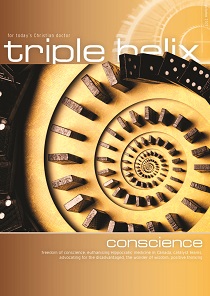'Conscientious objection (CO) is the refusal to perform a legal role or responsibility because of personal beliefs. In health care, conscientious objection involves practitioners not providing certain treatments to their patients, based on reasons of morality or conscience.' [1]
Everyone has a conscience. Everyone has a worldview. Unsurprisingly, 'everyone' includes healthcare professionals, students, and patients. Looking back over our studies, careers, or personal lives, I am sure we can all think of times where we have been asked to do or say something with which we are unhappy. That deep discomfort - sometimes like an automatic reflex, sometimes like a churning within. That sometimes-palpable feeling or thought that something about this situation does not feel right.
With our Christian worldview, we may feel certain things we are asked to do in the health service are wrong and that we should not be involved in them. Typically, people think of conscientious objection around beginning and end of life issues - such as abortion and euthanasia. However, there are many other areas where we may feel we need to conscientiously object. What we are or are not comfortable with might not necessarily look the same for every Christian. For example, different Christians may feel differently about prescribing various types of contraception.
One key theme is that CO is fundamentally linked with integrity and the ability to act according to your beliefs and principles. It is something we should strive to protect. However, CO is regularly under attack from different angles and different groups. [2] We do have some rights to CO, which we should be grateful for and seek to preserve.
What does the Bible say?
We see many examples in Scripture where followers of God stand up against what they were being asked to do, as it conflicted with their service to God. We can find a classic example in chapter three of the book of Daniel. This chapter recounts how King Nebuchadnezzar had made an image of gold and decreed that when the sound of music was heard, everyone had to fall down and worship that image. However, Shadrach, Meshach, and Abednego refused to worship the image, despite being threatened with a blazing furnace. They knew that worshipping a false god was wrong; they objected and refused to bow down. They were ultimately saved from the heat of the burning furnace, but not until after they had been chucked into it!Flicking through the next few pages of our Bibles, in Daniel chapter six, we see another example. Daniel was faced with a choice. He could either follow the King's decree to stop praying for 30 days, preserving his life, or continue to pray to God and face the death penalty in a lion's den. The decree had been purposefully introduced to catch Daniel out since he was a distinguished government official on a career pathway to ruling the kingdom. Daniel got cast to the lions, but despite this, God miraculously rescued him.
If it is possible, as far as it depends on you, live at peace with everyone. (Romans 12:18)Clearly, there are times when our Christian values will cause us to object to things we are asked to do. The two examples from the book of Daniel demonstrate where obeying God meant breaking the law and facing the death penalty. We need to be firm to abide by our values but also peaceful in our approach when we can - this is no easy balance!My conscience is clear, but that does not make me innocent. It is the Lord who judges me. (1 Corinthians 4:4)However, it is important also to remember that our consciences are fallible. [3] Romans 14 talks about not going against conscience or forcing others to go against theirs. We should keep prayerfully reflecting on the Scriptures, continue to seek wisdom, and train our consciences to be sensitive to 'God's values'.
What does the law say?
There is currently a statutory right to CO in two areas of healthcare - participation in abortion [4], [5] and participation in technological procedures to achieve conception and pregnancy. [6] What exactly participation entails remains the subject of much debate. When it comes to abortion, the Doogan case [7] led to narrowing the definition of 'participation' (a 2014 CMF blog by Philippa Taylor explores this in more depth [8] ).What do the medical organisations say?
Guidance from the General Medical Council (GMC) is generally helpful when it comes to CO, recognising that everyone has personal beliefs that affect their day-to-day practice.'We recognise that personal beliefs and cultural practices are central to the lives of doctors and patients, and that all doctors have personal values that affect their day-to-day practice. We don't wish to prevent doctors from practising in line with their beliefs and values, as long as they also follow the guidance in Good medical practice.' [9] Therefore, it is vital to be aware of the Good medical practice (GMP) [10] guidance surrounding conscience. For example, 'Patients have a right to information about their condition and the options open to them'. We should explain the available options and not obstruct them. However, as individual health professionals, we do not necessarily have to provide them with full information or an onward referral (as long as we abide by GMP guidance).
The British Medical Association (BMA) - as a professional body and trade union representing doctors - supports a 'limited right' to conscientious objection'. [11] In addition to the statutory rights of CO, 'the BMA would support a request by a doctor seeking to exercise a conscientious objection to withdrawing life-sustaining treatment from a patient lacking capacity - where another doctor is available and willing to take over care.' [12] It goes on to say that reasonable, lawful requests for CO should be considered but are not a right. [13]
The Nursing and Midwifery Council has its own guidance on CO. [14]Not all things we object to in healthcare might be seen as a typical conscientious objection. For example, when it comes to honesty and truth-telling, we might feel we have to object to something we're being asked to do or say. For example, some of us may have been asked to put something on an imaging request which was not an accurate record of the patient's symptoms or signs. It is still essential to maintain our integrity and politely object to what we are being asked to do in these situations. The way we handle this is key and requires wisdom and discretion; there may be a negotiable way forward where you do not have to compromise your personal value of honesty.
Can we tell our patients?
The GMC says: 'You may wish to mention the reason for your objection, but you must be careful not to imply any judgement of the patient.' [15]The BMA says: 'doctors should not share their private moral views with patients unless explicitly invited to do so.' [16]Realistically, different situations will require different approaches. We should seek wisdom and be careful here, but always be prepared with an answer in case we are asked! A full explanation may not be necessary or welcome. Still, a brief, winsome sentence or two may help to put things in context. They may even act as a positive 'faith flag' rather than imply a negative judgment of the patient.Can we tell our colleagues?
The GMC says: 'You should also be open with employers, partners or colleagues about your conscientious objection. You should explore with them how you can practise in accordance with your beliefs without compromising patient care and without overburdening colleagues.'It is generally much better to have these conversations before you encounter the thing you want to object to. Whatever stage of your career you are at, you can have a conversation with your colleagues about how to practice in accordance with your beliefs. This conversation often gives a natural opportunity to discuss the why behind your position. There is also an important aspect of 'give and take' - offer to take on something else (that your colleagues don't want to do) if your CO would mean additional work for your colleagues.
Conclusion
We must act with integrity throughout our career and Christian walk, and CO is integral to that. We should be grateful for current protections around conscience and seek to uphold those. We should communicate wisely with our colleagues to find ways around some of the challenges that our CO might introduce. Occasionally it may be appropriate to share our reasons with patients, but we must do this with great sensitivity and wisdom.Melody Redman is a Clinical Genetics Registrar in Leeds
CMF will be publishing a new booklet in autumn 2021 with practical guidance on exercising freedom of conscience as a Christian health professional. See cmf.org.uk/bookstore for details
































